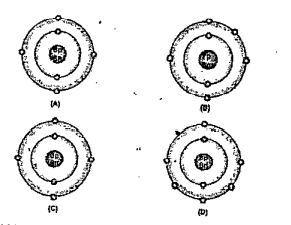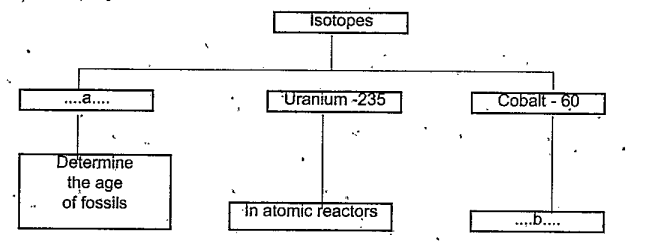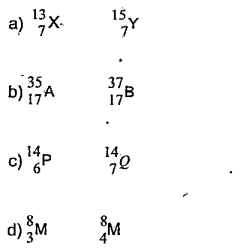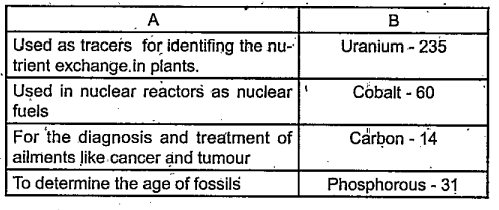Complete Solutions to QUESTION BANK of chapter Structure of Atom of Class 9 book with complete answers and questions
| Class 9 | CHEMISTRY |
| Chapter | Structure of Atom |
| V PUBLICATION | QUESTION BANK |
| Number Of Questions | 45 |
| Academic Year | 2023-24 |
Names of some scientists and their contributions are given shuffled in the following table. Match them suitably.

View SolutionAtomic number of an atom Z=17, Mass number=35. a) Find the numbér of protons, electrons and neutrons in the atom. b) Write the electronic configuration of the atom. C) Draw the Bohr model of atom.
View SolutionThe mass number of an atom is 31 . The M shell. of this atom contains 5 electron.
A)What is the atomic number of this atom?.B)How many neutrons does this atom have?.C)Write the electronic configuration.
View SolutionBohr models of atoms A,B,C are given (Symbols are not real). a) Write the atomic number, mass number and electronic configuration of the atoms. b) Among these, which are isotopes? Why? .

View SolutionSymbols (not real symbols) of some atoms are given
`underset(8) overset (17) \ P`, `underset(18) overset (40)\Q`, `underset(8) overset (16) \ R`,`underset(20) overset (40)\S`
a) Find the atomic number and mass number of these elements .
b) Which among these are isotopic pairs?
c) Draw the Bohr model of atom Q
View SolutionPrepare a table with the electronic configuration of elements of atomic number from 1 to 18
View SolutionDraw and exhibit the Bohr mọdel of elements having atomic number 1 to 10
View SolutionThe formula for finding the maximum number of electrons that can be accommodated in a shell is ......
View SolutionThe method of arrangement of electrons in different shells in an atom is called:......
View Solution….. is formed by the reaction of deuterium with oxygen is used in nụclear reactors.
View SolutionThe third shell (M) can accommodate a maximum of ………..electrons.
View SolutionThe mass number of an atom is 17 Atomic. number is 8 What is the number of neutrons present in. it?
View SolutionProtium, deuterium and .........are the three isotopes of hydrogen
View Solution……………...are atoms of the same element having same atomic numiber and different mass number.
View SolutionProtons and ........ are found in the nucleus of an atom.
View SolutionThe scientist who found isotopes.
View SolutionFind the relation and fill up suitably.
Charge of proton :positive
Charge of neutron:
View SolutionWhich are not related to dalton's atom theory below.
a) Matter is made:up of very small particles called atoms.
b) Atoms of the same elements will identical in properties, size and mass. c) An atom has a centre cailed nucieus.
d) As long as an electron revolves in a par ticular orbit, its energy remains constant.
View SolutionFind the atomic number of the atom which is given below. `(16) overset(32) \A`Underset
View SolutionThe representation of the Bohr atom model of an element is given below.
a) What is the number of electrons in the L shell of this element?
b) Write the mass number.

View SolutionBohr models of atoms A, B,C,D are given (Symbols are not real).
a) Write the atomic number, mâss number and electronic configuration of the atoms.
b) Among these, which are isotopes? Why?

View Solutiona) What is the difference between atomic number and mass number.
b) If the mass number of an element is 52 , and atomic number.is 24 , then how many neutrons will be there in the nucleus of its atom?
View SolutionNotice the three atomș given below:
` underset(17) overset(34) \Q , underset(16) overset (33)\ X , underset(17) overset(37)\Z`
a) Which are the isotopes among the following atoms.
b) Why?
View SolutionA,B, C, D and E five elements (These symbols are not real?
`underset (7) overset (17)\ A ,underset(6) overset(16)\B, underset(7) overset(16 )\C, underset (8) overset (16) \D, underset(8) overset(17) \E`
a) Find out which among them are isotopes.
b) Find out the number of neutrons in each one.
View SolutionGiven below are the three isotopes of Hydrogen.
`underset(1) overset(1) \H, underset(1) overset(2) \H, underset(1) overset(3) \H(protium, Deuterium, Tritiüm)`
a) How do these differ in the subatomic particles present in them?
b) Which isotopic of hydrogen is used in nuclear power plants?
View SolutionComplete the table.

View SolutionDraw the Bohr model of argon atom. (Atomic numberAr=18 )
View SolutionGive reason for the following.
a) atoms are electrically, neutral.
b) Most of the mass of an atom is concentrated in its nucleus.
View SolutionIn the atom of an element 7 electrons are present in the M shell. : There are 18 neutrons in the nucleus of atom:
a)Write down the electronic configuration of the given atom.
b) What is its.mass number?
c). How many electrons are present in it.
View SolutionAn atom of aluminium (Al) has 13 electrons and 14 neutrons in it.
a) What is the atomic number of aluminium?
b) What is its mass number?
c) Represent aluminium atom using the symbol.
View SolutionSome details of the atoms X and Y are given below.
a) Find the mass number of elements X and Y.
b) Find the relationship between these two atoms.
c) Write there electronic configuration.

View SolutionAtomic number of an atom Z=17, A=35.
a) Find the number of protons, electrons and neutrons in the atom.
b) Write the electronic cónfiguration of different shells.
c) Draw the Bohr model of atom.
View SolutionSymbols (not real symbols) of some.atoms are given. `underset(8) overset (17) \P ,underset(18) overset (40) \ Q, underset(8) overset (16) \R`
a) Find the atomic number and mass number of these elements.
b) Which among these are isotopic pairs?
c) Draw the Bohr model of atom Q.
View SolutionTrue or false? .
a) All particles in the atom have charge.
b) Electron and proton haveopposite charges. So atom has no charge.
c) Mass number is the total number of electron, proton and neutron.
d) The number of neutrons are obtained on substracting atomic number from mass number.
View SolutionLook at their properties in the table. Try to fill in the blanks.

View SolutionSome questions related to atoms are given below. Choose correct word from the box and answer the questions.
Nucleus, Proton, Atomic number, Mass nümber, Electron, Neutron shell a) What is.the number of electrons in an atom.
b) Centre of the atom.
c) Negatively charged particle revolve around the nucleus.
View SolutionAn element is represented as follows (Symbol is not real)
`underset(13) overset (27) \X`
a) Write the electronic configuration of the element.
b) What is the number of electrons in the shell with highest energy?
c) Find out the number of neutrons in this atom.
View SolutionThe mass number of an element is 23 and its atomic number is 11
a) Find the number of electrons.
b) Find the number of neutrons.
c) Write the electronic configuration.
View SolutionAn atom has three shells. If there are 4 electröns in the third shell, then
a) What is its atomic number?
b) What is the number of protons?
c) What is the number of electrons?
d) Write the method of arrangement of the electron, in the shell?
View SolutionThe atomic number of an element is 15 .its mass number is31. Write the electronic configuration and draw its Bohr model.
View SolutionComplete the table given below.

View SolutionFill suitably.

View SolutionAtoms of elements are made up mainly of protons, electrons and neutrons.
a) Which of these particles are present in the nucleus of atoms?
b) The discovery of which particle is related to the scientist .J. J. Thomson?
c) Name the positively. charged particles?
d) Name the scientist who proved that most of. the mass of an atom is concentrated in the nucleus?
View SolutionChoose the pairs of isotopes from the following.
Symbols are. not real.

View SolutionMatch the following.

View Solution
QUESTION BANK questions and complete solutions for chapter Structure of Atom of V PUBLICATION of Class 9